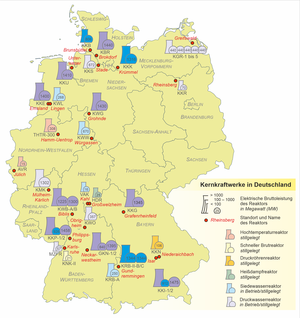Is Germany’s decision to retire its nuclear power plants and turn to renewable energy the result of real concerns over the safety of the German nuclear plants—or is it just politics? And if it is the latter will German voters hold Angela Merkel’s hand and jump off the cliff—or just push her?
In 2010, Chancellor Merkel used some of her political chits to force approval of an unpopular life extension plan for Germany’s nuclear power plant operators pushing the retirement dates out to 2036. In February, Germany cut its feed-in tariff for renewables by 15 percent. Already fuming from these actions, Merkel’s opponents used Fukushima to hammer her coalition over energy policy in state elections in March 2011 that cost her control of Baden-Württemberg after 58 years.
The chancellor is giving the people what they want—and giving it to them hard.
Germany has suspended eight of its reactors after Fukushima and now will retire all 17 of its reactors in 12 years. Together the German nuclear fleet provides 23 percent of its electricity while renewable energy provides 13 percent of Germany’s electricity.
To meet Germany’s energy future with renewables requires tripling its current renewable installed capacity and then backing it up. The cost of this rapid transition will be high for German ratepayers and it may begin hitting the fan as early as this summer since the nuclear plants now closed must be replaced to meet peak load demands. Purchase power is not going to come cheap at peak summer prices and then there is the question of who will pay for the premature closure of these life-extended nuclear plants.
There will also be onerous costs on Germany’s competitive economic position so the Chancellor risks a backlash as the true cost of this policy shift is assessed, revealed and debated.
And there is the small matter of 47,000 German coal miners and their family and friends worried they might be next. Germany has been committed to greenhouse gas emissions reduction and its nuclear fleet gave it a solid foundation for growing its renewable energy base to offset its dependence upon coal. Shutting down the baseload nuclear plants requires more than replacing that energy with new sources—it requires resolving the problem of the intermittency of renewable energy and the risk to grid stability that all that baseload nuclear power provides. Attempting this transformation with renewable resources requires a gigantic technological leap of faith about capacity factors, efficiency, transmission, storage and other grid changes that will add to the cost burden in so short a time period.
Maybe German coal miners will feel more secure until Germany decides that achieving its emissions reductions targets requires replacing its dirty old coal fired generation with cleaner, newer natural gas combined cycle plants and burn Russian gas instead of German coal. I’m sure the Russians will be glad to sell it to them.
Related articles
- Germany Will Phase Out Nuclear Power by 2022 (ecogeek.org)
- Merkel spins round to lead Germany’s anti-nuclear movement | Sabine Rennefanz (guardian.co.uk)
- Germany wants nuclear exit by 2022 (news.cnet.com)
- Anti-nuclear Movement, Helping the German Economy go Wrong (blogcritics.org)
- Merkel announces end of German nuclear era (independent.co.uk)
- Nuclear Phaseout Will ‘Pay Off’ for German Energy Research, Says Panel Chair (news.sciencemag.org)


2 Comments